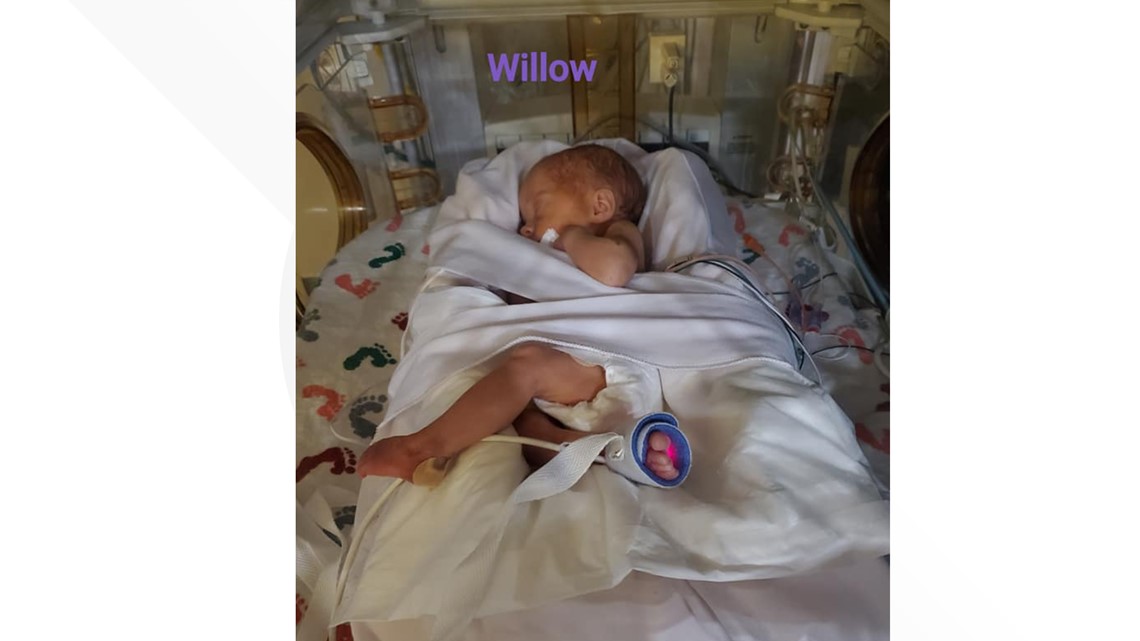ATLANTA — A Georgia mother is warning other parents to be wary of what and how their newborn children are fed, saying it can have irreversible consequences. She, like a group of parents nationwide, claims a disease that could be possibly linked to baby formula is causing premature babies to die or suffer lifelong complications.
Now, for the first time, the issue will be heard in front of a jury.
These parents are pointing to necrotizing enterocolitis (NEC), a serious intestinal disease among premature babies. Abbott and Mead Johnson, two formula manufacturing giants, are facing legal challenges.
Heather Holley, a Hampton, Georgia, mother, is now emphasizing the need for more awareness and transparency in neonatal care.
"Some people might say, how can you still believe in a God that would take your child from you?" she asks from the pews of First Baptist Church in Hampton. "We should have asked more questions."
Holley's twins, River and Willow, were born prematurely at 32 weeks via C-section. Despite her desire to exclusively breastfeed, doctors explained that they would need to fortify the twins' milk with formula, a common practice in many hospitals.
"They explained that to us as they would just add extra calories to my breast milk during their feeds," she recalled. "It was kind of nonchalant like, 'Hey, we're just going to give them a boost.'”
Tragically, shortly after starting on the fortified milk, River developed NEC. Holley's newborn did not survive.
"Her intestinal system was shutting down, rotting, dying," she said.
NEC is a serious condition where the intestinal tissue starts to die off, and it is considered a lethal disease, claiming about one baby's life every day, according to Dr. Ravi Patel, who is a professor of pediatrics at Emory University and neonatologist at Children's Healthcare of Atlanta.
"It's a lethal disease," Patel said. "There's a lot of work to try and understand why."
While providing breast milk is known to be one of the best preventive measures against NEC, according to Patel, hospitals often resort to more accessible options like cow's milk-based formulas, despite decades of research indicating the importance of premature infants being fed breast milk.
For example, in 2011, the US Surgeon General warned premature babies who are not breast fed are 138% more likely to develop NEC.
In 2017, the American Academy of Pediatrics released a statement citing studies to support the use of human milk in infants with a birth weight under 3.3 pounds in decreasing rates of necrotizing enterocolitis.
"The knowledge has been out there for years, and no one has been doing anything about it," Attorney Steven Reck said.
Reck, representing over 1,000 clients, argues that formula companies failed to warn parents adequately about the risk of NEC. He's leading the legal challenge against Abbott and Mead Johnson, the makers of Similac and Enfamil.
"No one ever tells the moms that 'Hey, we're going to feed this formula, and by the way, it could cause your baby to get this horrible intestinal disease,'" Reck said.
Despite the ongoing legal battle, the companies deny the allegations. In a statement, a spokesperson for Mead Johnson said the allegations are "without merit." A spokesperson for Abbott said the allegations are a result of "a theory promoted by plaintiffs’ lawyers rather than the medical community."
The NEC Society, a nonprofit organization dedicated to promoting research, advocacy, and education surrounding NEC, released a statement about the lawsuit that read in part: "NEC is a multifactorial condition without one specific cause. The NEC Society is not involved in the litigation around formula and NEC because we remain focused on our mission. Lawsuits are not a strategy used by the NEC Society towards our vision of a world without NEC."
Read the full statements at the bottom of this story.
Holley said she doesn't know for sure if the formula caused River to contract NEC.
However, she also said she was never warned about the potential risks of formula feeding -- not even after River died.
Soon after, doctors wanted to start Willow on the same fortified milk routine, according to Holley.
"They're telling me this is what they have to do to feed her and to keep her alive," she explained. "Really pushing it. I was afraid. I'm like, 'OK, I don't want to lose my other daughter.'"
Less than 12 hours later, Holley got another call saying Willow wasn't doing well either.
"They said that she had started showing the same symptoms as River," she recalled.


Remembering the anger she felt at that moment, still grieving her daughter River, she made a decision using only what she could describe as a mother's instinct.
"I said under no circumstance are you to give her anything but my breast milk," she said.
After losing River, Holley fought to ensure that Willow received only breast milk, which she sourced from donors across the state.
"They're the reason that little girl's alive," Holley said.
Today, Willow is four years old, a living reminder of the importance of advocating for the best care of premature babies.
For Holley, young Willow is also proof that her prayers were answered.
Have a tip for 11Alive Investigators? Text "investigate" to 404-885-7600 or email us at investigates@11alive.com. Your story and information are important to us; we'll make sure it gets to the right person on the team who may be in touch.
Mead Johnson's full statement on NEC, baby formula
Mead Johnson has over 120 years of expertise in infant nutrition and stands by our unwavering commitment to sound scientific innovations that provide safe, high-quality infant formula products to every parent and caregiver who puts their trust in us. The allegations are without merit and attempt to grossly oversimplify complex medical conditions with theories not upheld by experts in the medical community.
Abbott's full statement on NEC, baby formula
Abbott has spent decades researching, developing, testing and producing formulas and fortifiers for premature infants, and countless infants have benefitted tremendously from these products. These allegations are without merit, advancing a theory promoted by plaintiffs’ lawyers rather than the medical community, which considers these products part of the standard of care for premature infants.

